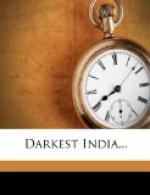Pick out your coarsest, cheapest grains, and weigh them to the last fraction of an ounce. Rigidly exclude from the poor man’s bill of fare any of the relishes which he so much esteems, and the cost of which is so insignificant as to be hardly worth mentioning, and yet you will find legions of gaunt, hungry men, women and children, who would greedily accept your offered regimen to-morrow, if you could only discover the wherewithal for obtaining the same, and who would gladly pay for it with the hardest and most disagreeable description of labour.
Take for instance the prison diet, where the food is given by weight, and where it is purposely of the coarsest description consistent with health. That the quantity is insufficient to satisfy the cravings of hunger I can myself testify, having spent a month inside one of Her Majesty’s best appointed Bombay prisons, and having noted with painful surprise the eagerness with which every scrap of my own coarse brown bread, that I might leave over, was claimed and eaten by some of my hungry, low-caste fellow prisoners!
The clothing and the blankets are also of the very cheapest description. Of course it must be remembered too, that the food and materials being bought in large quantities, are obtained at contract prices which are considerably less than the usual retail rates in the bazaar. And yet notwithstanding these facts it costs the Bombay Government on an average Rs. 2/4 per month for each prisoner’s food, and close upon Rs. 2 a year for clothing, besides the cost of establishment, police guard, hospital expenses and contingencies. Altogether according to the figures given in the Jail Report of 1887 for the Bombay Presidency, including all the above mentioned items, I find that the average monthly cost to Government for each prisoner is a little over Rs. 6 a head.
Now it is a notorious, though almost incredible, fact, that in many parts of India, men will commit petty thefts and offences on purpose to be sent to jail, and will candidly state this to be their reason for doing so. Many Government Officials will, I am sure, bear me out in this. Here we have men who are positively so destitute that they are not only prepared to accept with thankfulness the scanty rations of a jail, but are willing to sacrifice their characters and endure the ignominy of imprisonment and the consequent loss of liberty and separation from home and family, because there is absolutely no other way of escape! In Ceylon the jail is familiarly known among this class as their “Loku amma”, or “Grandmother”!
India has no poor law. There is not even the inhospitable shelter of a workhouse, to which the honest pauper may have recourse. Hence with tens of thousands it is literally a case of “steal or starve.” I suppose that nine-tenths of the thefts and robberies, besides a large proposition of the other crimes committed in India, are prompted by sheer starvation, and until the cause be removed, it will be in vain to look for a diminution of the evil, multiply our police and soldiery as we will.




